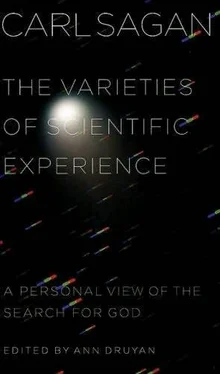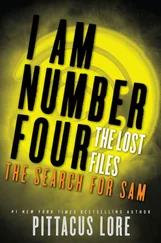CS:Again, a good question, and I was merely talking about the justification for the search for signals from advanced civilizations in our galaxy. Clearly you can imagine them in some other galaxy. For their signals to reach us here, they have to have a technology far in advance of ours, but that's perfectly possible. And in fact Frank Drake and I have made a search of just a few nearby galaxies with exactly that idea in mind. We found nothing at the few frequencies we looked at. But, you see, once you start imagining signals coming from another galaxy, then you are into significant power levels and therefore significant dedication by some other civilization to try to make contact with what for them would be a distant galaxy. If you imagine civilizations in our own galaxy, you can at least contemplate that they know that this solar system is a plausible abode for life, even if they haven't visited here to check it out, that there's some way that they could target our particular region of the galaxy for a specific message. There's no way that this could be the case from a distant galaxy, as far as I can see.
This does remind me, though, that I forgot to say something. Very nearby civilizations can detect our presence, and that is because television gets out. Not just television but radar. Radar and television get out. Most of AM radio, for example, doesn't. So let's just look at the television for a moment. Large-scale commercial television broadcasting on Earth begins when? In the late 1940s, mainly in the United States.
So forty years ago there's a spherical wave of radio signals that spreads out at the speed of light, getting bigger and bigger as time goes on. Every year later it's an additional light-year away from the Earth. Now, let's say it's forty years later, so that expanding spherical wave front is forty light-years from the Earth, containing the harbingers of a civilization newly arrived in the galaxy. And I don't know if you know about 1940s television in the United States, but it would contain Howdy Doody and Milton Berle and the Army-McCarthy Hearings and other signs of high intelligence on the planet Earth. So I'm sometimes asked, if there are so many intelligent beings in space, why haven't they come here? Now you know. It's a sign of their intelligence that they haven't come. (I'm just joking.) But it's a sobering fact that our mainly mindless television transmissions are our principal emissaries to the stars. There is an aspect of self-knowledge that this implies that I think would be very good for us to come to grips with.
Questioner:How do you recognize the truth when it is upon us?
CS:A simple question: How can we recognize the truth? It is, of course, difficult. But there are a few simple rules. The truth ought to be logically consistent. It should not contradict itself; that is, there are some logical criteria. It ought to be consistent with what else we know. That is an additional way in which miracles run into trouble. We know a great many things-a tiny fraction, to be sure, of the universe, a pitifully tiny fraction. But nevertheless some things we know with quite high reliability. So where we are asking about the truth, we ought to be sure that it's not inconsistent with what else we know. We should also pay attention to how badly we want to believe a given contention. The more badly we want to believe it, the more skeptical we have to be. It involves a kind of courageous self-discipline. Nobody says it's easy. I think those three principles at least will winnow out a fair amount of chaff. It doesn't guarantee that what remains will be true, but at least it will significantly diminish the field of discourse.
Questioner:Have you any comments to make on the Shroud of Turin?
CS:The Shroud of Turin is almost certainly a pious hoax; that is, not a contemporary hoax but a hoax from the fourteenth century, when there was significant traffic in pious hoaxes. And my technical knowledge of the Shroud of Turin comes from Dr. [Walter] McCrone of Chicago, who has worked on it for some years. He found the "blood" to be iron oxide pigments, and there is nothing that cannot be explained by the technology available in the fourteenth century. By the way, there is no provenance of the Shroud of Turin earlier than the fourteenth century [8]So I'm sorry that my knowledge is secondhand on this issue, and I know that there are people who believe, for reasons that are apparent. No, I'm sorry. I haven't said that fairly. There are people who believe that it is the authentic death shroud of Jesus on the cross. But the evidence is very meager.
Questioner:The religionists proffer ghosts and miracles. The physicists propose equations. What is the fundamental difference between them?
CS:A very good question. How can we tell what's what? One thing we can do is we can check out the explanation in terms of repeatability. Verifiability So, for example, if physicists after Isaac Newton say that the distance that a falling object falls in time t is a constant times t 2, and if you are skeptical or dubious about that, you can perform the experiment, and you will find that if it takes twice as long to fall, it goes four times farther, and so on. They will also say that the velocity increases proportionately to the time. You can check that. You can drop boulders off bridges, if it's permitted by the local police, and check out these contentions. After a while you get a sense that, at least in this limited realm, the physicists know what they're talking about. What is more, it is remarkable that Buddhist physicists find just the same regularity. And Hindu physicists, and atheist physicists, and Christian physicists, and so on. All find the same laws of nature. Somehow it doesn't depend on the local culture, on the local training. What the physicists say seems to be true all over the Earth. And then you look at other planets. Other stars. Other galaxies. And the same laws apply everywhere.
Now, this doesn't say that every contention of every physicist has this wonderful degree of regularity. Physicists make mistakes just like anyone else. But the way in which physicists have an advantage is that there is a tradition of skepticism and a tradition of mutually checking out each other's contentions. Whereas in religion there is a practice of great reluctance to challenge what any other member of the professional caste says. That is not true in physics. A physicist is almost as delighted in disproving another physicist's contention as in demonstrating some new principle of physics. And you know Newton's famous remark that if he had seen further it was by standing on the shoulders of giants. What he meant was that there is a continuous progress in science. And through this progression of insights, through this mutual checking, the subject advances mightily. Whereas if you take supposed religious proofs of the existence of God, it is really quite remarkable that no new proof has been offered-never mind the validity-no fundamentally new proof has been offered in centuries. The anthropic principle that I talked about in an earlier lecture is as close as you can come, but it is merely a variant on the argument from design.
So I see methodologically a significant difference between how science proceeds and how religion proceeds. Now, an earlier questioner gave a very good example. He said, "Scientists talk about the expanding universe. What began the expansion?" Now, many astrophysicists would say that's not their problem. Their problem is to tell you what the universe is doing but not to tell you why it's doing it. They avoid that "why" question- and it's not due to modesty, although it's sometimes phrased in a way to suggest that we don't want to mess around with the really big questions. But physicists love to mess around with the big questions. The reason that questions such as "Why did the universe expand?" are considered off-limits is that there's no experiment you can do to check it out.
Читать дальше










